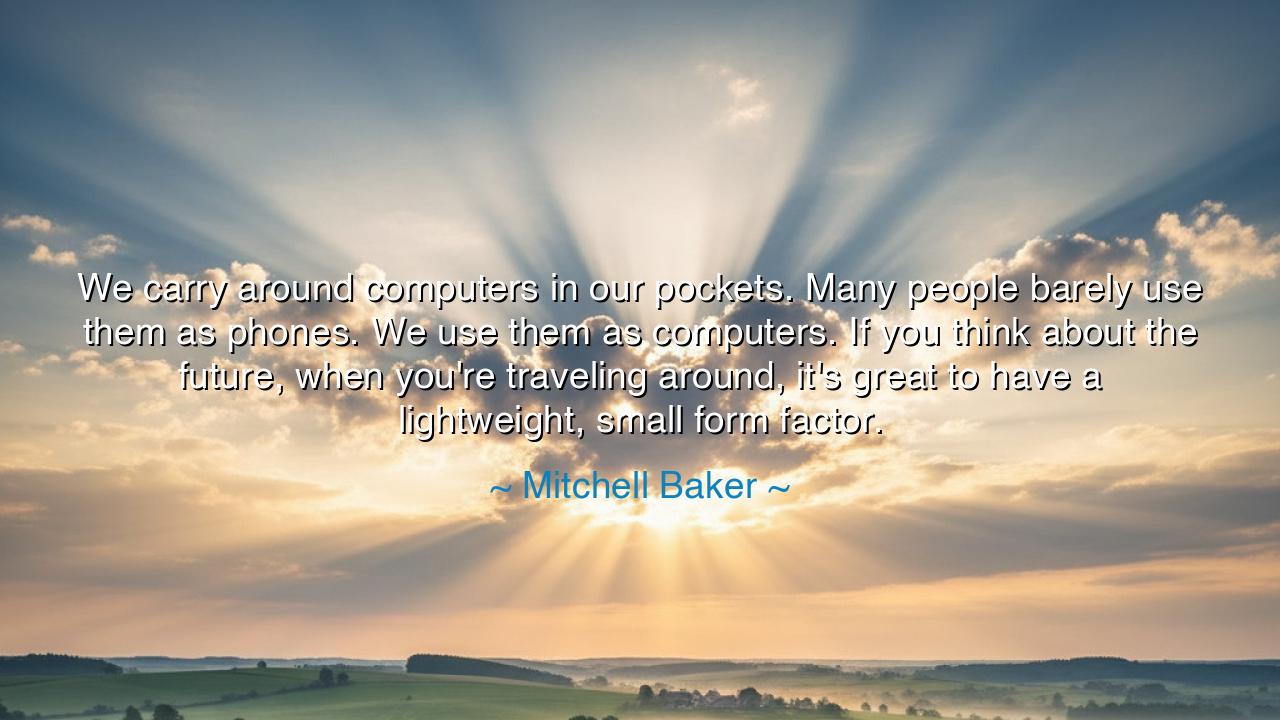
We carry around computers in our pockets. Many people barely use
We carry around computers in our pockets. Many people barely use them as phones. We use them as computers. If you think about the future, when you're traveling around, it's great to have a lightweight, small form factor.






In the vast expanse of time, there are moments when human innovation transcends the boundaries of its own imagination, bringing forth creations that reshape the very nature of existence. In these moments, we must stop and reflect, as Mitchell Baker invites us to do, with his words: "We carry around computers in our pockets. Many people barely use them as phones. We use them as computers. If you think about the future, when you're traveling around, it's great to have a lightweight, small form factor." These words are a recognition of the monumental shift in human existence, one that has changed the way we interact with the world, with knowledge, and with one another. In the palms of our hands, we now carry tools that were once the domain of gods and kings.
To understand the depth of this revolution, one must turn the pages of history, to the time when the great minds of ancient civilizations were only beginning to grasp the concept of tools and technology. The Greeks, with their mastery of the mind and spirit, believed that the key to human advancement lay not only in the body’s strength but in its ability to create. They gave birth to the first calculators in the form of abacuses, and with them, the ancient world began to take its first steps toward an age where information could be harnessed, stored, and transferred. And yet, what they could not have imagined was the humble device we now carry in our pockets—a computer that has evolved from a tool of kings into an extension of our very selves.
Much like the Romans with their aqueducts, whose engineering marvels made life easier for millions, the advent of personal computing in the modern world has been just as transformative. The early computers, massive in size and power, were once housed in the grandest buildings, accessible only to the privileged few. Yet, as Baker so eloquently points out, these very same machines now fit into the palms of our hands, available to anyone who seeks to harness their power. It is as though we have unlocked the power of the ancient gods, but in a form that is as accessible as a conversation with a friend.
Reflect, if you will, on the story of Gutenberg, who, with his invention of the printing press, altered the course of human history. Before the press, knowledge was contained within the walls of monasteries, and only the few could read the sacred texts that guided the world. With his press, however, Gutenberg spread knowledge far and wide, opening the doors to an era of enlightenment. Today, our computers and smartphones play a similar role—amplifying our access to knowledge and communication, making us the heirs of that same age of enlightenment. And yet, we use these powerful tools not just for communication or learning, but for tasks both great and small, from the mundane to the profound.
In the modern world, we have democratized information, making it available to all, no matter their station in life. Baker's insight into the evolution of the phone into a computer highlights the fluidity of technology—it is not static; it evolves, adapts, and grows to meet the needs of society. In the future, we may look back on these times and marvel at how we carried around devices that connected us to everything, and yet in doing so, often disconnected us from the present moment. Just as the Greeks once marveled at the stars above, we must now consider the wonders we carry within our hands—tools of incredible power, yet requiring wisdom to wield.
Thus, the lesson from Baker's words is clear: we live in an age of unprecedented access, where knowledge and communication are at our fingertips. But with this power comes the responsibility to use it wisely. The devices we carry are not just extensions of our hands—they are extensions of our minds, our souls, and our very existence. It is not enough to simply own a piece of technology; we must master it, understanding that it is a tool that can either bring us closer to our humanity or distance us from it. We must embrace the power these tools provide, but also be mindful of the way they shape our lives.
As we step forward into a future where technology will continue to evolve at an ever-accelerating pace, let us not forget the ancient wisdom that tells us that true power lies not in the tools we wield, but in the wisdom with which we use them. Just as the Romans built their aqueducts to serve the needs of their empire, so must we build our digital infrastructure to serve the greater good. We must remain grounded in the present moment, even as we embrace the incredible advancements of the future. Let us use the tools we carry in our pockets to connect, to learn, and to grow, but let us never lose sight of the true purpose of these tools: to serve humanity, not to replace it.






AAdministratorAdministrator
Welcome, honored guests. Please leave a comment, we will respond soon